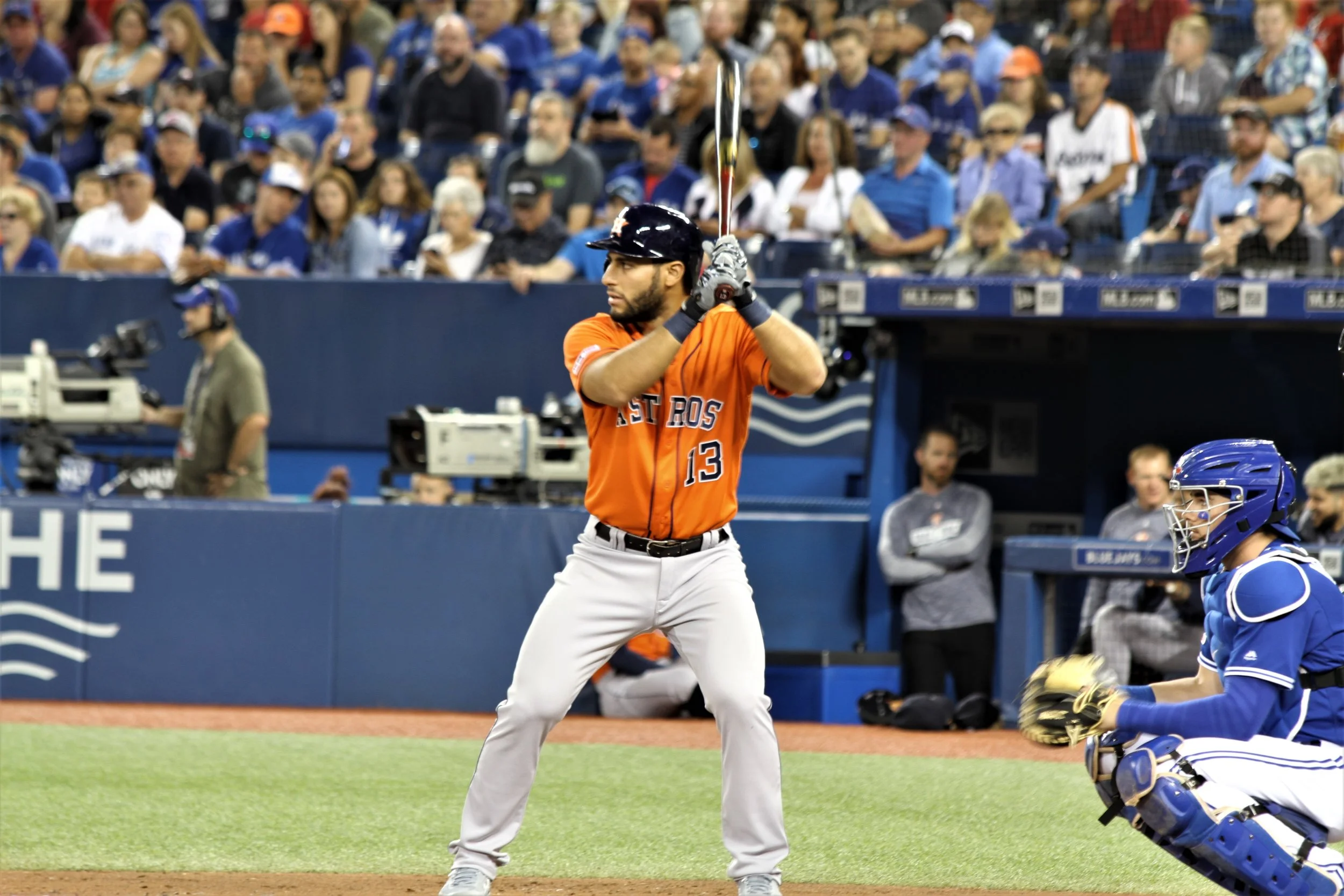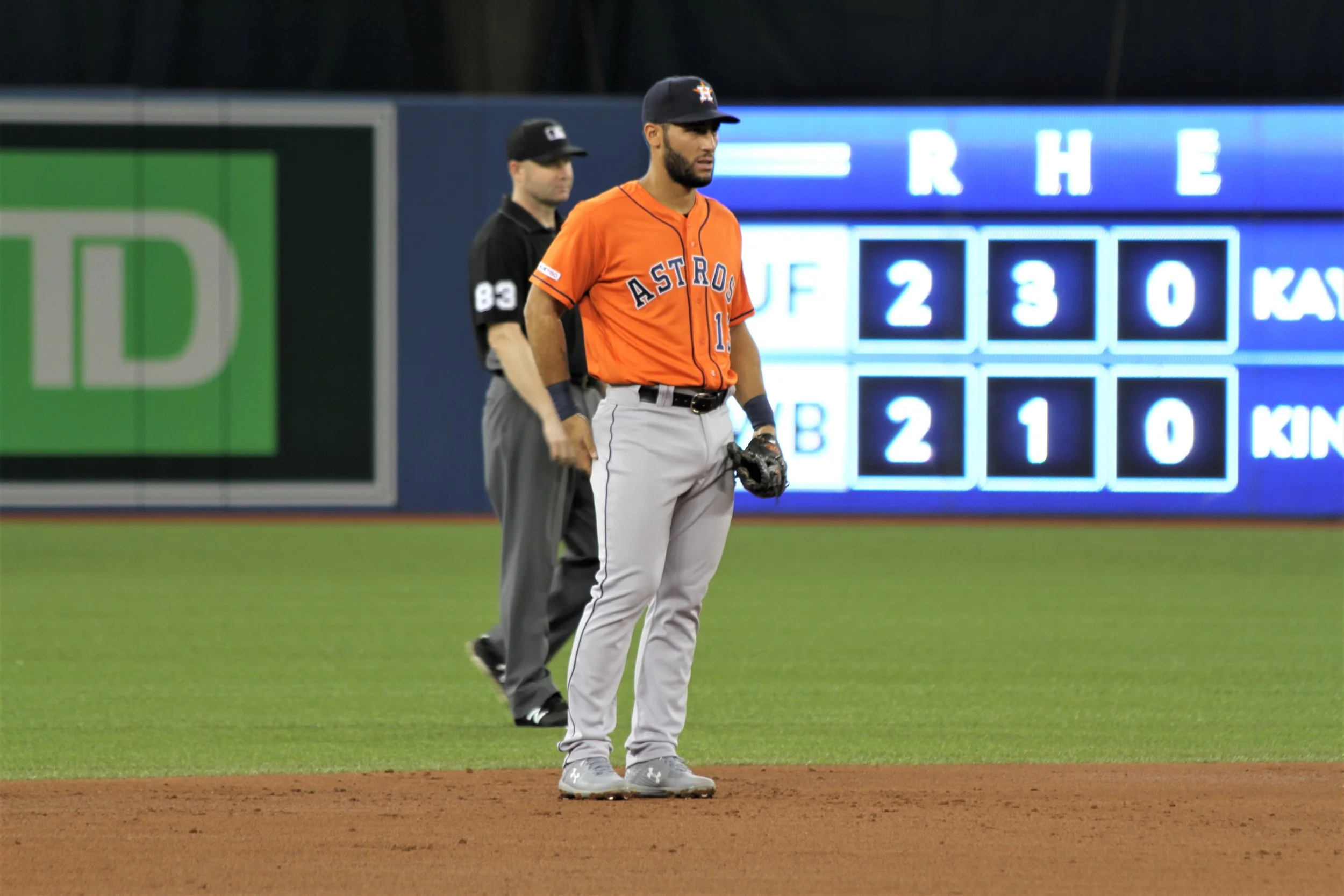Tournament 12, Canadian scout helped Toro rise to the big leagues
Houston Astros third baseman Abraham Toro (Longueuil, Que.) impressed scout Jim Stevenson (Leaside, Ont.) with his physical tools and his ability to slow down the game and perform under pressure. Photo: J.P. Antonacci
September 3, 2019
By J.P. Antonacci
Canadian Baseball Network
Houston Astros area scout Jim Stevenson liked Abraham Toro’s tools – his strong arm, power stroke and keen batting eye.
But there was an intangible quality about him that convinced Stevenson and the Astros to reach for the infielder from Longueuil, Que., in the fifth round of the 2016 MLB draft.
“This kid plays with a real ease to him. The game doesn’t get too sped up for him,” Stevenson said. “He gave me that feeling of, yeah, we got something here.”
The scout from Leaside, Ont., watched the young Canadian develop at Seminole State College in Oklahoma.
“We’ve been blessed at taking these JUCO guys who kind of fly under the radar,” said Stevenson, whose recent junior college finds include Toro’s Houston teammate Josh James, a hard-throwing reliever, and Oakland Athletics outfielder Ramon Laureano.
“I’ve always been partial to Canadian kids, to take a long look at them, because they can take a little longer to develop,” Stevenson said.
JUCO players, he continued, give some teams pause because of worries over inflated stats due to aluminum bats.
“Everyone wasn’t sure that (Toro’s) power was real, but you have to look at the skill set and the tools, and his body of work over the full year,” Stevenson said.
From the fall to the spring of Toro’s draft year, Stevenson saw his power and defence improve, and with them his confidence.
“Even at that young age, he had a real confidence with the strike zone. He wouldn’t swing at bad pitches,” Stevenson said, adding that unflappable players like Toro “have a different kind of heartbeat to them.”
“For a kid coming from Canada to the U.S., a lot of times they’re overwhelmed. He never was.”
***
Toro inherited his love of baseball from his Venezuelan parents, who moved the family to Quebec when he was a child.
“My dad was a huge fan of baseball. My whole family was,” Toro said. “Since the first time I played it, I liked it and fell in love with it.”
He played Little League and high school ball in Montreal, and suited up for the Montreal Orioles of the Quebec Junior Elite League.
“I went to a lot of the Expos games when I was young. And then when they left, I still watched baseball,” Toro said. “That was at a time when Russ Martin and Eric Gagne were two big names from Quebec, so I would say (baseball) was big.”
Like many young athletes, Toro dabbled in other sports, namely volleyball and indoor soccer.
“But baseball, I always took it seriously,” he said.
Primarily a pitcher at first, Toro shifted to the infield exclusively when he was 15. A year later he was playing in Tournament 12, the national amateur scouting showcase held at Rogers Centre, alongside future major leaguers Mike Soroka and Josh Naylor.
“There’s a lot of guys that ended up getting drafted from that year. It was a pretty cool experience,” Toro said.
After two years at T12, the promising youngster could clearly see a future for himself in professional baseball.
“I mean, I always believed in myself, but when I truly believed was at 17, when I believed I had a shot at getting drafted,” he said. “I was getting stronger, my arm was getting better, and my overall tools were getting better.”
One skill the natural right-hander picked up around that time was the ability to switch-hit.
“I would mess around, take some lefty swings, but I never did it in a game. One time at 16, I just started doing it,” Toro said. “It turned out pretty good. At the beginning, it was – I wouldn’t say a struggle, but the timing was off a little bit. And then I just practised, practised, and now it’s become natural to me.”
He explained that switch-hitting gives him a good luck at pitches from both sides of the plate.
“Especially with the sliders,” he said. “When it’s righty-righty, it looks like it’s coming at you, and then it’s a strike. (Batting) lefty against a righty, I can see it the whole way through the zone. So that’s helped me a lot.”
***
Heading into the 2016 draft, Toro was hopeful that an organization would take a chance on him in the later rounds. He said he was surprised to get a call from Stevenson on the second day of the draft telling him that Houston was about to select him in the fifth round (157th overall).
“They told that they really watched me for a while. They liked that I switch hit, they liked my offence, they liked my tools,” Toro recalled.
Stevenson said he’d heard that a few other teams were interested in Toro, but the Astros weren’t sure how highly other organizations had graded him.
“We liked him so much (and) I felt so comfortable with him that our guys in the development team said, ‘Let’s jump this guy early,’” Stevenson said.
ABC grad Abraham Toro (Longueuil, Que.) has played third base for the Houston Astros since he has been promoted, but Astros Canadian scout Jim Stevenson (Leaside, Ont.) believes Toro might play a super utility role with the Astros in the future. Photo: J.P. Antonacci
Toro advanced steadily through the Astros system, landing in double-A Corpus Christi by the end of 2018. This year was a breakout for the power-hitting third baseman, who slashed .306/.393/.513 in 98 games at double-A, with 16 home runs and 70 RBIs.
He was hitting a blistering .424/.506/.606 in 16 games at triple-A Round Rock before an injury to Houston infielder Aledmys Diaz prompted Toro’s promotion to the majors on August 22.
“He had a great spring training and (Astros manager) A.J. (Hinch) really liked him,” said Stevenson, noting that Toro was one of the team’s final Grapefruit League cuts.
“And then when something happens like an injury, they’re going to get someone they’re comfortable with.”
Toro recorded his first hit in his second career game, on August 23. He hit a ground ball up the middle that Los Angeles Angels second baseman moved over to intercept.
“So I hit the ball and it was kind of through the hole. I was busting down the line and I see that I had to run, because it was going to be a bang-bang play. I was called safe, and it was kind of a relief that you get the first one out of the way,” said Toro, who flew down the line and broke into a big smile after he beat the throw.
His first career home run followed on August 29, a solo shot at home against Tampa Bay on a day when he also walked three times. He picked up his first career steal on Monday in Milwaukee. So far he’s 7 for 29 over his first 10 games, with five walks and six runs scored.
Last season, Toro told CBC News that his goal was to make it to the big leagues by 2020. That timeline sped up this year, and Toro has made the most of his opportunity.
“As a kid, you always hear ‘you never know who’s watching.’ And actually, it’s true,” he said.
“One month ago, I was playing in double-A and I could never imagine that I was going to be in the big leagues one month later. So it’s true, I guess. Somebody liked me and liked what they saw, and that’s why I’m here.”
The entire baseball world was watching Toro on Sunday, when he hit a home run with two outs in the bottom of the ninth in support of Justin Verlander’s no-hitter, and then calmly fielded a ground ball and threw out Toronto’s Bo Bichette at first to end the game.
The unheralded 22-year-old kid from Quebec was suddenly a household name.
“He’s gotten as much attention in these few days as he has his whole career,” Astros manager A.J. Hinch joked after Sunday’s game, which ended a three-game series in Toronto that saw Toro conduct numerous interviews in both official languages – and Spanish for good measure – and enjoy a warm reception from Toronto fans.
“It’s been fun,” Toro said. “Being here at T12, I just wanted to be a big leaguer. And now that I’m here, playing professionally in Toronto in front of family and friends, it truly means a lot to me.”
His parents, relatives and friends made the trip from the Montreal area to see Toro make his professional debut on home soil.
“The support, it was unbelievable. As soon as I got called up, they knew I was going to play in Toronto. I didn’t even know at the time,” he said. “But since day one, they said they were going to come, and they did.”
***
Sharing in that sense of pride in Toro’s achievement was the man who scouted him.
“It’s been a great experience for the whole family and, I think, the city where he grew up. It’s really special. He’s a real humble kid,” Stevenson said.
“That’s what we do this for. It’s a special moment when a kid you drafted gets called up to the big leagues.”
Having Toro and other junior college signings make it to the Show is a validation of Stevenson’s focus on junior colleges, where players don’t come accompanied by reams of performance data and appearances at high-profile showcases.
“When you’re drafting JUCO guys, it’s raw scouting, raw evaluating,” Stevenson said. “You get much more gratification out of those kids.”
In the years ahead, the veteran scout could see Toro filling a super-utility role with Houston, playing all over the infield like Gurriel or former Astro Marwin Gonzalez.
“They like him. I know that other teams have always been asking for him in trades, and (Houston) always says we want to keep him,” Stevenson said. “Being able to play multiple positions – the more versatility you bring also helps your opportunity to stay longer.”
For his part, Toro is soaking in the experience and learning all the lessons he can from his time in the big leagues.
“The preparation is unreal. Watching the guys, a lot of them have been here for years, so I’m trying to see how they do it,” he said.
“You know, the name of the game is to stay healthy. You can have all the talent in the world, but if you’re not healthy, you can’t play. So I’m trying to learn and see what I can bring to my routine to stay healthy and perform.”


